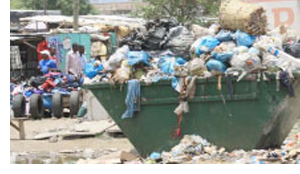 DISEASES such as cholera, dysentery and typhoid which break out nearly on an annual basis are associated with uncollected garbage in residential and other areas.
DISEASES such as cholera, dysentery and typhoid which break out nearly on an annual basis are associated with uncollected garbage in residential and other areas.
The fact that these disease outbreaks occur mainly in the urban centres is not surprising because these are some of the places where you find heaps of garbage which keep on growing because it is rarely, if at all, collected and safely disposed of to various dumpsites.
Local authorities have, therefore, a mammoth task of ensuring that streets and townships in their respective towns and cities are kept clean.
This is because most of the disease outbreaks are directly linked to filth, which is squarely blamed on the local authorities’ failure to collect garbage from surrounding areas.
Not long ago, the Ministry of Local Government and Housing came to the rescue of councils when it bought refuse compactor trucks and other garbage collection equipment, which it hoped would ease the challenges of waste management disposal faced by many councils in Zambia.
The ministry further purchased 16 utility vans for 14 of the newly-created districts for the same purpose, as well as skip trucks, bins and some containers.
As the ministry was ‘bailing out’ some councils, the Lusaka City Council (LCC) bought close to 200 of its own skip bins, more than 100 bins and 20 containers using its own resources.
LCC also bought two compactor trucks, and said it was in the process of procuring a landfill compactor, bull dozer for the landfill, two tractors for waste collection in conventional areas, two tipper trucks and one front-end loader.
In towns and cities, garbage collection is not an easy undertaking. For this reason, even city councils like LCC have sought partnership with private garbage collection companies.
The idea is to enhance waste management systems to serve conventional and peri-urban settlements in the capital city. This led to LCC realigning its waste management districts by increasing the zones from the previous 12 to 16.
Currently, LCC is engaged in what it calls a franchise contract with private garbage collecting firms that are responsible for setting and collecting waste fees from individuals in mainly residential areas these companies collect garbage from on a weekly basis.
LCC’s collaboration with other firms, including the private sector in waste management, has helped the city council keep especially low-density residential areas clean.
Companies doing business in other cities and towns need to emulate Lusaka-based firms and also team up with their respective local authorities in the task of garbage collection.
Kudos should, therefore, go to Nkana Water and Sewerage Company (NWSC) which yesterday handed over solid waste management equipment to Kitwe City and Kalulushi Municipal councils.
And NWSC managing director Diana Makwaba was spot-on when she said: “The provision of solid waste equipment is meant to contribute to improved environmental management through the collection of solid waste, especially in low-income communities where currently service is inadequate or non-existent.”
To this we may add that such efforts can go a long way in helping prevent diseases associated with filth in surrounding areas.






